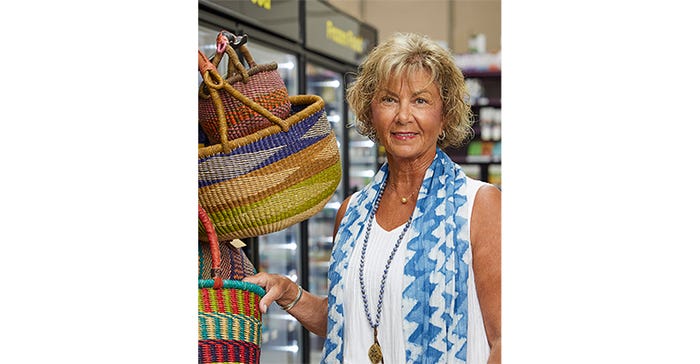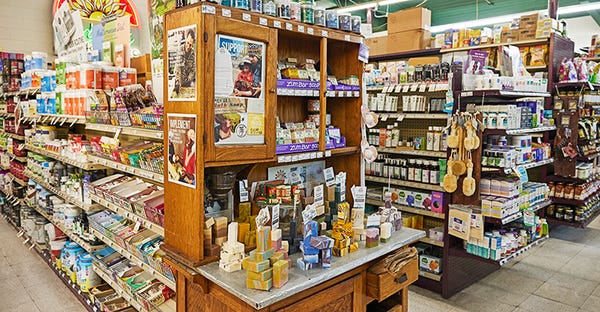August 9, 2022

In her own words, Renée Southard is "crazy-passionate" about wellness, sustainability, education, advocacy and empowerment. Since 1992, the owner of Organic Marketplace in Gastonia, North Carolina, has educated her community about herbs and nutrition, helped generations of customers take charge of their health and been a leader in her city's sustainability efforts. She has also built a knowledgeable, dedicated staff whom she empowers to carry on her work—or "do it even better than I did."
But Southard's impact reaches far beyond her store and city. For the last six years, she has served as education director of SENPA, a national nonprofit supporting independent natural products retailers and manufacturers. Now the organization's president, Southard is on a mission to help her fellow retailers hone their business skills, start succession planning and empower the next generation of natural products leaders. Also, through SENPA, she is training up advocates for this industry, "building an army" to lobby lawmakers to ensure continued consumer access to dietary supplements.
Natural Foods Merchandiser sat down with Southard to discuss the arc of her retail journey and how she's laying the groundwork for the future.

What led you to start Organic Marketplace, and what was it like in the early days?
Renée Southard: I was having health issues I'd never experienced before and found that herbs took care of them. That led me to open the store in an 800-square-foot space that sales reps told me was hard to find, but rent cost me only around $1,000 a month.
Back then, it was just me working seven days a week. I kept a card catalog of my customers, and on days when no one walked through the door, I'd call them to ask how this or that product was treating them. I became involved in their lives. To this day, their children and their children's children come in and tell me they remember me. There is absolutely nothing better than being in business for 30 years and having three generations come in.
How did you evolve the store over the years?
RS: I found that while herbs and supplements are great, grocery stores at that time didn't carry the cleaner foods needed to support the body with nutrition. So a few years in, I went from a supplements store to a food market. We knocked out walls and took over two more 800-square-foot spaces. Then one day my current landlord persuaded me to look at a 5,000-square-foot two-level fire station that's literally behind my house. When I walked in, I just knew. I moved the store there, and that's where we've been for 20 years.
We added raised beds out back and opened a little organic restaurant downstairs, which has gone through many renditions. I'm a single woman who raised two sons, and I eventually found another woman who is an amazing chef and needed a pay-it-forward. I gave Carla [Sinteff] the opportunity to have her own business within my business. I have nothing to do with the restaurant anymore, which is the beauty of it.
What are some ways Organic Marketplace practices environmental responsibility?
RS: We have been bag-free for eight years and always look for minimal packaging. We still have a bulk section, and we tare peoples' containers. We are getting ready to renovate and I'm talking to my landlord about putting solar panels on the roof and doing other things to be more sustainable, give power back to the grid or power our own store. We've also always been a sustainability leader in our community. We go out and talk to schools and serve on the board of Keep Gastonia Beautiful.
What do shoppers love most about Organic Marketplace?
RS: They love the store because I come from a teaching background, so every staff member is super educated. Some staff have been with me for 17 or 18 years. They are a very cohesive team and all close in age. I've built confidence in them, and it's beautiful to watch.
How did the COVID-19 pandemic impact your business and team?
RS: We were not closed one single day, and I am so proud that we didn't have one infected employee. That's a tribute to our industry. We know what a virus is, and we know how to deal with it. We were very consistent with our masking and cleaning policies. Through all the craziness, we learned what resiliency and community are all about—and we learned our place in the community. Even though we are small, we were able to be effective for so many people and have been tremendously supported because of that.

Now that you're leading SENPA, is your staff taking on more responsibility?
RS: Because of our goals at SENPA, I had to figure out a way to be more present and able to go to trade shows and wherever else the association needs to be. So now, while I'm still 100% involved in my business, my team is carrying the torch. I've been able to lead a national organization by allowing them to do their jobs. This is the next generation, and we've got to enable them and get them ready to step in. It's a present to an owner to be transitioning out but still there for them. If we have a hiccup, we talk about it and solve it together. They still have an advisor in me and we make major decisions together, but I've got to tell you, they don't need a lot from me.
And this is what you'd like to impart on other retailers as well?
RS: Yes. At SENPA, we're trying to teach owners that we need to look into the future and look to the next generation. We've spent so many years—and our blood, sweat and tears—living and breathing the solution, and there comes a point when we should think about succession. I am so passionate about helping owners understand that succession doesn't mean waiting until a sickness or family illness forces you to make a rash decision and leave your business. It means giving yourself time to look at your staff and environment and see who shows a real desire to make a difference in people's lives. That's why we all came into this business, and now we're the dinosaurs, so it's time to teach and empower these so-called kids.
What are your other key initiatives through SENPA?
RS: The natural products industry has always been stellar at coming together in a crisis, so I want us to all pull together—all the organizations, trade associations and magazines—because we're going to have to hit the advocacy button again. My passion is building industry advocacy to the level we had when DSHEA passed, when we had Sen. Hatch and many other supporters in Congress.
SENPA is taking the lead on creating a group of like-minded people who can put our heads together, look at what's in front of us and start addressing it. We are trying to teach lawmakers about our industry on a state level—that's where you start, because these are the people who get into national positions. This is a really large on-taking, but nothing in my SENPA presidency is more important than educating people and ensuring we have a seat at the table.
What keeps you enthused about your work after so many years?
RS: What keeps me enthused is the hope that health food stores can take on another level of sustainability. We have to be better stewards of our food. On St. Croix, where I live part-time, they have vertical gardening, which could be an impressive model. My dear friend Brenda Watson of Vital Planet has an amazing garden in back of her manufacturing facility, and she gives the food to the community. These are the kinds of things we need to be doing, and it could be another revenue stream for retail.
What do you enjoy doing outside of work?
RS: I love my yard. I love to garden. I love to be in blue water. I have a beautiful labradoodle, Raven, who is a little rockstar. I love that my life doesn't run from the moment my eyes wake up to the moment I go to sleep. I have time to breathe, put my hands in the dirt and sit back and watch, smell and feel it grow. I have time to appreciate things now, and I am beyond grateful.
About the Author
You May Also Like
.png?width=700&auto=webp&quality=80&disable=upscale)



